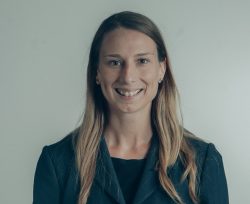
Stacy Gnacinski, Assistant Professor of Health Science
Dr. Gnasinski joined Drake July 5, 2017 and earned her PhD in Health Sciences from the University of Wisconsin – Milwaukee. She earned a MS in Kinesiology with specializations in Sport Psychology and Exercise Physiology also from UW-Milwaukee. She holds a BS in Biology from the UW-La Crosse. Stacy is a Certified Strength and Conditioning Specialist (CSCS) and will be teaching courses in physiology and bioethics.
What is your role at Drake and what drew you here?
I am an assistant professor of Health Sciences at Drake, teaching Physiology (HSCI 125) and Values/Ethics (HSCI 105). Next fall, I also hope to launch a new Health Sciences elective called Psychological Aspects of Health Behavior. What drew me here was the opportunity to work with bright and energized students, collaborate with a diverse faculty, as well as expand my community-engaged research agenda to Des Moines and surrounding areas.
What excites you most about being here?
The opportunity to work with students in my research. To this point, I have been delighted to find so many students are interested in gaining research skills, and collaborating with myself and other faculty in community-engaged projects.
How would you describe your teaching style?
Together, my experiences as a first generation student and training in performance psychology have shaped my student-centered philosophy about, and passion for, teaching in higher education. Informed by research literature and outcomes of my teaching experience, I have formed several core beliefs about teaching and learning. In order for students to achieve academic success, I believe students must experience the following: (a) challenges to their existing capacities, (b) candid and ongoing performance feedback, and (c) instructional support and resources that enable them to process performance feedback to construct knowledge.
I apply various methods of pedagogy to provide the most robust learning opportunities within and outside the classroom. Such methods include, but are not limited to, facilitating in-class experiential activities (e.g., acting out scenarios), facilitating academic service learning, and utilizing diverse modes of assessment (e.g., content memorization, critical thinking and application, etc.).
If you had one piece of advice for current or prospective students, what would it be?
To succeed in the long-term, it is more important to focus on the quality of your didactic (classroom) and experiential (applied) learning, than it is to focus on the quantity of experiences amassed during college.
Favorite spot on campus?
My favorite spot on campus is by far Cowles Library.

